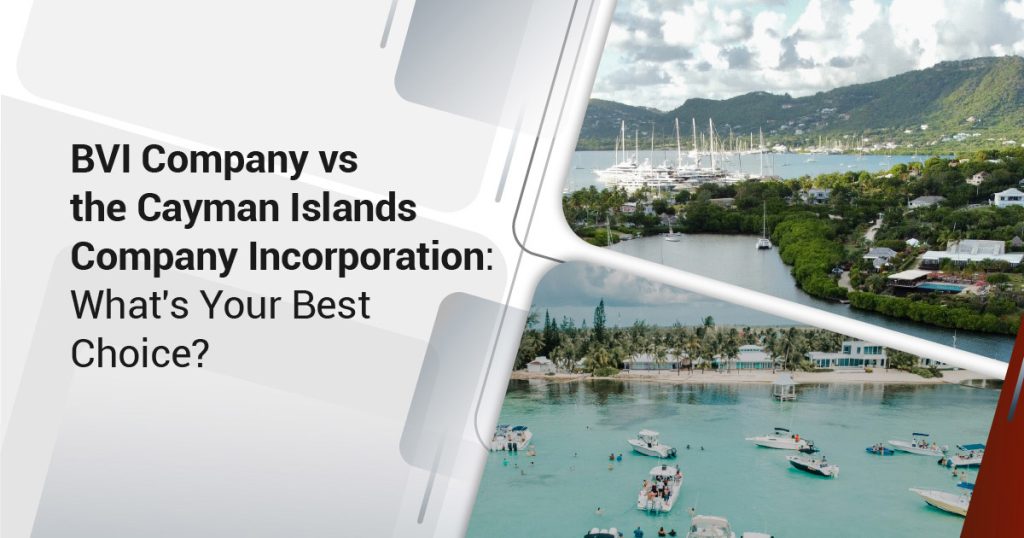The British Virgin Islands (BVI) and the Cayman Islands have long been synonymous with the term “Tax Haven,” attracting businesses worldwide seeking favourable tax conditions and financial privacy.
However, recent years have seen substantial tax changes as both jurisdictions have tightened their regulations in response to scrutiny from the global business community.

Central to these changes are the Economic Substance legislations implemented in both regions, reshaping the tax environment and operational requirements for offshore companies.
Given these regulatory changes, it is crucial to revisit each jurisdiction to find the most suitable destination for your offshore company. This article is your guide to making that decision by providing a comprehensive comparison of the BVI and the Cayman Islands.
In it, we explore their current business environments, regulatory frameworks, and key benefits, empowering you to make an informed decision about the best location for your offshore enterprise.
The BVI and Cayman Islands: At a Glance
The BVI and the Cayman Islands are renowned globally as premier offshore financial centres, each offering unique advantages for businesses seeking to optimise their operations. Both are British Overseas Territories located in the Caribbean Sea, providing a stable and attractive environment for international enterprises.
Cayman Islands
- 1960s Tax Policies: The Cayman Islands became a tax haven in 1966 by introducing a range of legislation that eliminated income, capital gains, and corporation taxes, attracting businesses and wealthy individuals.
- Legal and Regulatory Framework: The islands developed a robust financial system with banks, trust companies, and mutual funds, supported by a stable legal and political environment based on English common law.
Related Read: Cayman Islands Offshore Company Registration
British Virgin Islands (BVI)
- 1984 IBC Act: The BVI became a tax haven in the 1980s with the International Business Companies (IBC) Act, simplifying offshore company incorporation and eliminating taxes on offshore profits.
- Legal and Regulatory Framework: The BVI’s legal system, based on English common law, and a strong regulatory framework support its reputation as a secure offshore financial centre, attracting businesses and investors.
Related Read: British Virgin Islands Offshore Company Registration
|
BVI |
Cayman Islands |
| Population |
31,305 (2022 estimate) |
68,706 (2022 estimate) |
| GDP |
US$1.47 billion (2022 estimate) |
US$6.85 billion (2022 estimate) |
| GDP per capita |
US$46,997 (2022 estimate) |
US$99,624 (2022 estimate) |
| Area |
153 km² |
264 km² |
| Main Industries |
Finance, tourism |
Finance, tourism, real estate |
| Legal System |
English common law |
English common law |
| Currency |
US Dollar (USD) |
Cayman Islands Dollar (KYD) |
| Time Zone |
UTC-4:00 |
UTC-5:00 |
| Political Stability |
High |
High |
BVI vs Cayman Islands for Tax: Similarities
Both the BVI and the Cayman Islands are highly attractive for company incorporation due to their many shared benefits. Here’s a look at some of the key advantages:
Tax Benefits
- Both jurisdictions impose no corporate tax, capital gains tax, gift tax, inheritance tax, sales tax, or value-added tax.
- Dividends, interests, and royalties are tax-exempt as long as business activities are conducted outside their territories.
- This tax neutrality makes them highly appealing to businesses looking to maximise profits and minimise tax liabilities.
Fast Business Registration
- Efficient and quick company formation processes.
- Businesses can be incorporated in as little as 2 to 3 working days.
Business-Friendly Regulations
- Flexible corporate structures: BVI’s Business Companies (BC) Act and the Cayman Islands’ Exempted Company structure.
- No requirement for corporate directors to be residents, eliminating the need for nominee directors.
High Privacy
The BVI and the Cayman Islands both offer high levels of privacy. Information about company directors, shareholders, and officers is not directly accessible to the public, which is a significant draw for businesses prioritising confidentiality.
Fewer Requirements
- No mandatory capitalisation
- No requirement to hold annual shareholder meetings
- No obligation to submit financial records
Ease of Banking
- Strict controls over business banking
- Companies in BVI often have higher success rates with offshore bank applications and Electronic Money Institutions (EMIs)
BVI vs Cayman Islands for Tax: Differences
Despite the shared benefits, the BVI and the Cayman Islands have distinct characteristics that can influence your decision on where to establish your offshore company. Here are some key differentiators:
Comparison Based on Annual Fees
- BVI: Generally offers lower annual fees for company maintenance, making it a cost-effective choice for many businesses. Annual fees for a BVI company range from $350 to $1,200.
- Cayman Islands: Companies engaged in certain activities face higher annual fees, ranging from $850 to $3,132. This difference can be attributed to increased regulatory scrutiny and the additional value-added services provided by the Cayman authorities.
Comparison Based on Confidentiality Policies
- BVI: Requires companies to submit a register of directors to the Financial Services Commission (FSC), which can be accessed publicly for a fee. Shareholder information remains with the registered agent, and Ultimate Beneficial Owners (UBOs) are recorded in the BOSS system, and accessible to authorities.
- Cayman Islands: Also offers confidentiality but with differences. The memorandum and articles of association are private, whereas in BVI, they are publicly accessible. Both jurisdictions keep director and shareholder details private, but names of existing directors can be disclosed for a fee.
Comparison Based on Investment Fund Requirements
- BVI: Suitable for startups and holding companies due to lower costs. It has also become popular for cryptocurrency trading companies and digital assets businesses due to its flexible legislation.
- Cayman Islands: This jurisdiction is extremely favourable for establishing mutual funds and offshore investment funds. It is supported by robust infrastructure and specialised services. It remains the premier offshore jurisdiction for established investment funds and listed companies.
Comparison Based on Stamp Duty
- BVI: No stamp duty on transactions such as transfers of property, assets, shares, debt obligations, or securities. However, taxes are applicable for land-ownership transactions.
- Cayman Islands: No stamp duty on share transfers, but nominal rates apply to certain documents.
Comparison Based on Market Practices and Costs
- BVI: Preferred for lower government fees and annual maintenance costs, attracting startups and digital asset companies.
- Cayman Islands: Maintains a first-mover advantage for investment funds and listed companies due to its comprehensive regulatory framework.
Comparison Based on Secured Lending
- BVI: Features a public security registration system that ensures the priority of registered security interests, offering protection and transparency to secured creditors.
- Cayman Islands: Popular with secured creditors, though without the same level of public security registration as BVI.
Impact of Economic Substance Rules on BVI and Cayman Islands
Both the BVI and the Cayman Islands have implemented Economic Substance Rules to comply with global regulatory standards, ensuring companies conduct genuine business activities within their jurisdictions.
Economic Substance in the BVI
- In-Scope Entities: Includes BVI companies and limited partnerships (with or without legal personality).
- Requirements: Entities must demonstrate adequate physical presence, management, and control within the BVI, and conduct core income-generating activities there.
- Exemptions: Investment fund businesses are typically exempt from these requirements.
Related Read: Understanding the British Virgin Islands (BVI) Economic Substance Requirements
Economic Substance in the Cayman Islands
- In-Scope Entities: Covers companies registered under the Companies Law but incorporated outside of Cayman, as well as limited liability companies and partnerships.
- Requirements: Similar to BVI, entities must have substantial activities, an appropriate level of local employment, and incur adequate expenditures within the jurisdiction.
- Exemptions: Domestic companies, investment fund businesses, and non-tax-resident companies are generally exempt.
These rules elevate the BVI and the Cayman Islands to meet the expectations of a modern, transparent business landscape, ensuring they are not merely tax havens but jurisdictions with genuine economic activities.
Compliance is crucial for maintaining the integrity and reputation of businesses operating in these regions, aligning them with global best practices.
BVI vs Cayman Islands Company InCorporation: Which Jurisdiction Should You Choose?
Choosing between BVI and the Cayman Islands ultimately depends on your business’s specific needs and strategic goals. Both jurisdictions offer significant benefits but cater to different types of enterprises.
When to Choose to Incorporate a BVI Company
- Ideal for startups and smaller businesses looking for cost-effective incorporation and maintenance.
- Suitable for companies prioritising privacy and ease of operation.
- Preferred by cryptocurrency and digital asset businesses due to flexible legislation.
Related Read: Your Essential Guide to Setting Up a BVI Company
When to Choose the Cayman Islands
- Best for large enterprises, investment funds, and multinational corporations requiring a sophisticated regulatory environment.
- Attractive for businesses needing robust financial services infrastructure.
- Favoured for establishing mutual funds and complex financial structures.
Related Read: Complete Guide to Cayman Islands Company Incorporation
Each jurisdiction provides a distinct set of advantages, and understanding these can help you make an informed decision. Consult with legal and financial advisors to evaluate which location aligns best with your company’s objectives and compliance requirements.
Where to Next With InCorp
Choosing the right jurisdiction for your offshore company is essential for optimising business operations and ensuring compliance with international standards. Both the BVI and the Cayman Islands offer distinct benefits, but navigating their respective regulatory landscapes can be complex.
The nuanced differences in annual fees, confidentiality policies, and investment fund requirements make it critical to have a knowledgeable partner. InCorp’s expertise in both BVI and Cayman regulations ensures that your business not only complies with local laws but also maximises the advantages offered by these jurisdictions.
InCorp is dedicated to your success, providing tailored guidance, comprehensive support, and proactive compliance management. Our team will help you understand specific requirements and maintain proper documentation, ensuring your offshore company thrives.
Contact InCorp today for expert advice and assistance in choosing the best offshore jurisdiction for your business needs.FAQs about setting up a company in the British Virgin Islands (BVI)
- The BVI offers tax neutrality, ease of company formation, high levels of confidentiality, and lower incorporation and maintenance costs, making it ideal for startups and digital asset businesses.
- The Cayman Islands have a robust financial services infrastructure, sophisticated regulatory environment, and specialized services that support the establishment and management of mutual funds and complex financial structures.
- Generally, BVI has lower annual fees for company maintenance compared to the Cayman Islands, making it a cost-effective choice for many businesses.
About the Author
Alton Neo
Alton has deep technical expertise in the Singapore Financial Reporting Standards as well as hands-on experience in accounting for publicly-listed entities and growing enterprises in Singapore. Beyond that, Alton also provides expertise to fund managers and family offices on structuring.
More on Business Blogs
 Central to these changes are the Economic Substance legislations implemented in both regions, reshaping the tax environment and operational requirements for offshore companies.
Given these regulatory changes, it is crucial to revisit each jurisdiction to find the most suitable destination for your offshore company. This article is your guide to making that decision by providing a comprehensive comparison of the BVI and the Cayman Islands.
In it, we explore their current business environments, regulatory frameworks, and key benefits, empowering you to make an informed decision about the best location for your offshore enterprise.
Central to these changes are the Economic Substance legislations implemented in both regions, reshaping the tax environment and operational requirements for offshore companies.
Given these regulatory changes, it is crucial to revisit each jurisdiction to find the most suitable destination for your offshore company. This article is your guide to making that decision by providing a comprehensive comparison of the BVI and the Cayman Islands.
In it, we explore their current business environments, regulatory frameworks, and key benefits, empowering you to make an informed decision about the best location for your offshore enterprise.


